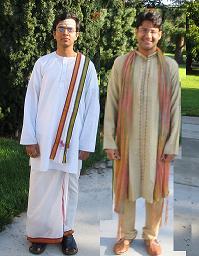The letter T in English generally has only the hard sound - potato is always पॊटॆटॊ, seldom पॊतॆतॊ. So whenever the soft T sound has to be represented, an H is suffixed to mellow it down, as in thanks. This should explain Seetharaman and Chandrakanth. The same logic is applicable for the D, which never has a soft sound in English - Distance, sudden, etc. Hence Dhandapani. So the moot question is not why southern names have th (or dh for that matter), but why northern names don't.
Let us consider the French word dame (as in la belle dame sans merci): it is read दाम्, or the word tous (as in a tous egards) which is pronounced तू. So do northern names owe their spelling to French influence? This is unlikely, for, with all their silent letters, French words are far less phonetic than northie names. And of course, French never boasted of much territory in the north during the colonial period.[1]
 Probably the first people to render Indian words in English were the British who learnt our languages. Sanskrit was studied by a large number of Western scholars, such as William Jones (founder of the Asiatic Society) and Max Mueller. They must have evolved a standard to romanise Sanskrit words, which could have been adopted for Hindi as well. [2] If they had written त as th, they would have had to represent the aspirated t (थ) as thh, which is rather hard on the eye as well as hand. Hence th for थ and t for त. Probably a compromise for readability. Ditto for d and dh.
Probably the first people to render Indian words in English were the British who learnt our languages. Sanskrit was studied by a large number of Western scholars, such as William Jones (founder of the Asiatic Society) and Max Mueller. They must have evolved a standard to romanise Sanskrit words, which could have been adopted for Hindi as well. [2] If they had written त as th, they would have had to represent the aspirated t (थ) as thh, which is rather hard on the eye as well as hand. Hence th for थ and t for त. Probably a compromise for readability. Ditto for d and dh.This however is not all. There are two other interesting th situations:
The Senthilnathan case (northerners beware): In some Tamil names, th is pronounced as it is in the English words there, the and thus. So, Senthilnathan is actually सॆन्दिल् नादन्.
The Geet Sethi case (southerners beware): Here th is neither as in thanks nor as in thus. It the aspirated hard t (ठ), as in boat-house, a sound for which there is no corresponding character in Tamil.
Phew! Now coming to sh. Why don't southern names have it? Well, in Tamil, the sounds s, sh as well as ch are all represented by the same letter ச. Its pronunciation varies depending on its position in a word, as per this rule: Except in the case when the letter occurs twice (in which case it would be ch), always read it as s. Hence Ganesan, Swetha and Viswanathan. However, the other southern languages do have a letter that is the equivalent of श. But it is still pronounced s, probably because of hereditary reasons -- these languages share the same ancestor with Tamil.
Having thus made a valiant attempt to answer the north Indians, I now have a question for them: Why r, and not d, in Baroda, Chandigarh and Chittore?
Notes:
[1] I was watching a Spanish programme sometime back, and came to know that as in French, the Spanish T's are also soft. Maybe it is true for other European languages, such as Italian, Portuguese as well.
[2] There are standards for transliterating Brahmic scripts (under which classification fall most Indian language scripts) formulated early last century. One is the IAST, adopted at the Congress of Orientalists in 1912, which uses diacritical marks on roman characters. Such as
(Another is the Harvard-Kyoto convention, which uses roman letters in a case sensitive way. E.g., gIt seThi, sendil nAdan. However this is of much recent origin, so we can ignore it for the current discussion.)
But I feel there must have been something earlier than even the 1912 IAST.
5 comments :
a keen thought process. gr8 writing. cool post :)
Hey Ramprasad,
Thanks a lot! Look forward to reading your thoughts - resume blogging quick!
I learnt something about this (transliteration of sound, and alterations of letters in language evolution) in this Sanskrit class I took here over a year ago. I'm trying to remeber what was told....trying hard, and failing...
:)
Do tell me if you can recollect or lay hands on old notes. It would make interesting reading!
Thanks for finally writing about > "On Senthilnathan and Geet Sethi" < Liked it!
My web blog ... Steinzeitdiät Erfahrungen
Post a Comment